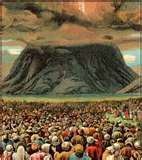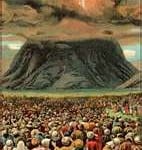On this week that precedes Rosh Hashanah, thousands of Jews gathered at the Western wall for a special evening of Selichot (penitential prayers) that were focused on the threat of Iran and its fanatic rulers. Just as in the time of Ahashverosh of the Purim story, another fanatic Haman declared that he would try to destroy the Jewish people. Just as in that time, the rulers of our days, are standing back and giving him the tacit permission to do so. Yet just as it was then, the Jewish people were gathered in for prayer before the time of battle. As a result of the call of the important rabbinic leaders of the Religious Zionist movement and some of the leading Kabbalists, a call for prayer was issued. Thousands heeded the call and were involved together in intense prayer into the small hours of the night.we stand assured that those prayers will be answered . What then lies behind the power of standing together in such a gathering?
Generally on the Shabbat before Rosh Hashana, the days of judgment of the whole world, this dramatic verse from the Torah portion of Nitzavim is read in the synagogues.
“You stand this day, all of you, before HaShem your G-d: your heads, your tribes, your elders, your officers, and every Israelite man; your young ones, your wives, the stranger in your gate; from your wood hewer to your water drawer.” (Deuteronomy 29:9)
Two concepts demand exploration. The first is the use of the word Hayom ( this day) and the second is Kulchem ( All of You)
The Chatam Sofer asked what is meant by the words “You stand this day,… “. Were they not standing before G-d earlier at Mount Sinai? Were they not standing before Him at the shores of the Reed Sea? Why must we be told that they were standing on “this day”?
The concept of standing before G-d is a daunting and frightening concept when one takes into account who He is and who we are. In fact even the Israelites of Exodus could not muster the spiritual courage to ” stand before G-d”. They implored Moshe to stand for them in their stead ” You go near, and hear all that HaShem our G-d may say; and you will speak unto us all that HaShem our G-d may speak unto you; and we will hear it and do it.’ ( ibid 5:23)
G-d responds favorably to their request and tells Moshe ” … “I have heard the sound of the words of this people that they have spoken to you; they have done well in all that they have spoken. Would that their hearts be like this, to fear Me and to keep all My commandments all the days, that it might be well with them and with their children forever! ( ibid 5:25-26) .
Yet now we hear the declaration;
“You stand this day, all of you, before HaShem your G-d “.
These words were spoken in the last 24 hours of Moshe’s life. Moshe is telling his people that he has endured the burden of being their protective covering for forty years. Now that they are about to enter the land, they must be prepared to enter the next phase of their Divine mission.
Until “this day” they had been the tools that G-d had been using to reveal His involvement in this world. After “this day” they were becoming active participants in that very revelation. They were about to enter the land of Israel without Moshe standing between them and G-d any longer. Henceforth they were going to stand themselves before HaShem their G-d . They were to do that in the land where Divine involvement with the world is more visible than in any other place in this world.
That thought should have been a daunting almost frightening thought. Could they live up to the task and the expectation?
The Baal Shem Tov related that whenever the word ” HaYom – this day” is mentioned it refers to Rosh Hashanah. We too stand before HaShem our G-d on this very day .That thought too should be daunting and frightening. A true understanding of the implications of such a “stand” should be enough to overwhelm our spirit and silence our tongues. What could we say at such a moment? Could we develop the courage to look upward and forward without being daunted by feelings of inadequacy?
The words HaYom-This Day ” are used elsewhere as well.
” And it fell on this day( Vayhi HaYom ), that he ( Elisha the prophet )came there, and he turned into the upper chamber and lay there. And he said to Gehazi his servant: ‘Call this Shunammite.’ And when he had called her, she stood before him. And he said unto him: ‘Say now unto her: Behold, you have been careful for us with all this care; what is to be done for you? Should you be spoken for to the King, or to the captain of the host?’ And she answered: ‘I dwell among mine own people.’ (Kings II 11-13)
The writings of the Zohar ( parshat Beshalach) offer another level of understanding to the encounter between the prophet and this simple woman. It explains that the prophet Elisha asks this woman if he can intercede on her behalf on “this day” that was Rosh Hashana before the “King” who is none other than the ultimate King.
Her answer gives insight and inspiration to all of us who are cognizant of our own stand before the King on this Day of Judgment. She answered ” I dwell amongst my own people”. Though I may feel inadequate to stand before HaShem on this or on any day, I wish only to be judged together with the entire people of Israel. Only when I become part of the corporate soul that is the people of Israel can I receive the empowerment to “stand before HaShem”.
That is the deeper meaning of the verse “You stand this day, all of you, before HaShem, your G-d”Only in the unity of the people is our judgment tempered with ultimate Divine mercy. Only when we understand that we are all part of a greater whole can we muster the courage to change and elevate our individual souls.
That is the secret of Rosh Hashanah. Before we enter into the days of Atonement and repentance we enter into the Palace of Rosh Hashanah . There, together, as a people, we declare G-d to be Ruler and Majesty of the Universe. Within that corporate purpose lays the empowerment for individual growth. The eternal concept of Klal Yisrael gives each member of that Klal ( community) the ability and courage to become the individual he needs to be. It is what gives each of us the courage to stand before Hashem in the celestial throne room on these great and awesome days. It is also that which gives us hope.

